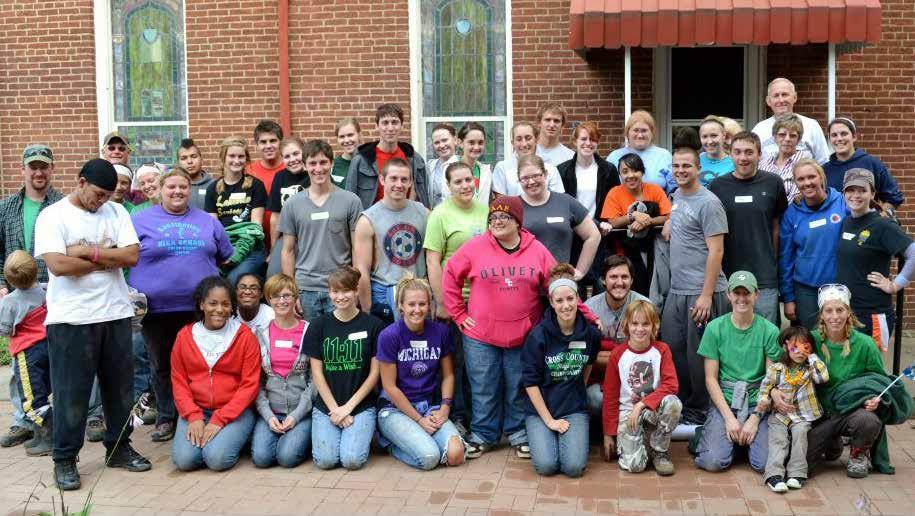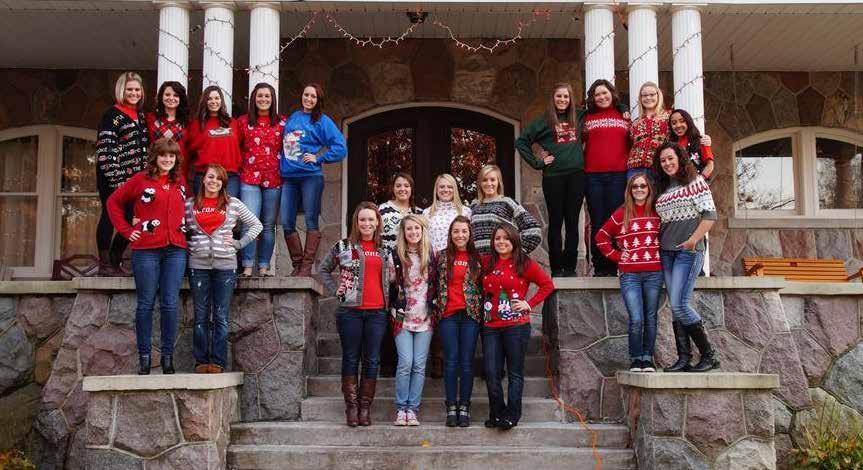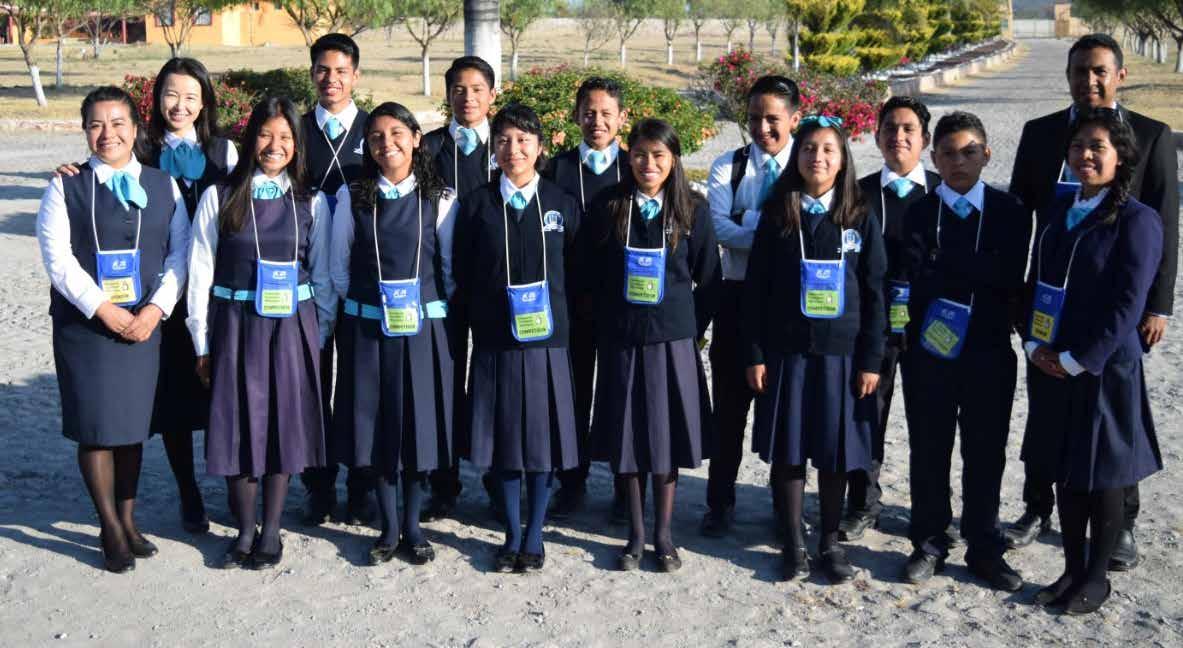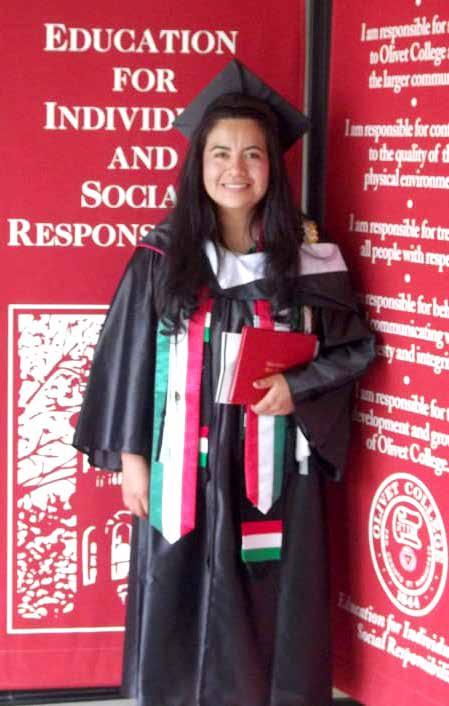
20 minute read
Being More and Doing Good as a Criminal Justice Professional
Zoe Feighner ’19,
Michigan State Police Trooper
Zoe Feighner ’19 recently began her criminal justice career as a Michigan State Police trooper. Her job is not only to serve and protect, but to promote social justice, community relationships and trust in the police force. Feighner believes her role as a criminal justice professional allows her “to be the change you wish to see in the world.”
A: I wanted to make a difference in people's lives. I’m a firm believer that you have to be the change you wish to see in the world, and I feel that working in the criminal justice field can help me do that.
A: I'm still fairly new to the CJ profession, but I feel that just being able to let people talk about what is upsetting them makes them feel a lot better and gives them a better view of CJ professionals.
A: Every day I am using the elements of crimes that I studied in my Michigan Criminal Law Class. I am evaluating crime scenes and paying attention to details similar to what I learned in the Cold Case Investigations course. I also believe that Olivet College has helped me prepare for interacting with diverse people and different cultures.
Q: What is your favorite part of your job?
A: Every day is different. You never know the kind of day you are going to have. You always have to be on your toes. I love interacting with people. My goal is to create a positive interaction, so people may have a better outlook on police officers. “I’m a firm believer that you have to be the change you wish to see in the world, and I feel that working in the criminal justice field can help me do that.” — Zoe Feighner ’19

— Kinslea Blouin ’19
Kinslea Blouin ’19, Child Protective Services
Kinslea Blouin ’19 is a Child Protectives Services investigator. She advocates for one of the most vulnerable populations and works to promote a healthy family structure. Blouin creates custom solutions and support for each case she works on, understanding that each family, each child and each situation is unique.
A: I love helping people create better lives for themselves. More specifically, in my career as a Child Protective Services (CPS) investigator, I get the opportunity to gain relationships and provide services for entire families. Criminal justice is a field where you may be the only positive influence in a person’s life, and I believe that is such a huge role to have and one that I take very seriously.
A: I am protecting children, as well as helping families make positive changes in their lives. We can provide services such as counseling, drug rehabilitation, AA support and intensive in-home parenting assistance. By providing these services, I am providing the family with an opportunity to change their lives in a positive way, which is helping the community as a whole. When we are in these children’s lives, we become someone they can talk to, look up to and trust. Shaping the next generation means shaping the future.
A: The CJ program gave me all of the tools to be successful in the field, and I carry many lessons with me that I learned in college. All of the professors have long backgrounds of working in the field, so they bring a lot of knowledge and experience to their teaching styles, which I loved. However, the biggest one may come from Dr. Regina Armstrong, director of the criminal justice program. She says, “Respect given is respect earned; disrespect given is disrespect earned.” Dr. Armstrong says this multiple times in all of her classes, and it is so true. In my job, I am someone that comes into a family’s home to investigate child abuse and neglect. Usually, the families I see are not happy that I am there and pretty hostile initially; however, if I show them respect and show them that I am there to help them, nine times out of 10 their attitudes change, and they respect me as well. Respect is not just given. You have to earn it, and I work really hard to earn the respect of my clients to give them the best opportunities to make a positive change within their family.
Q: What is your favorite part of your job?
A: The favorite part of my job is providing a service to a family and seeing it pay off. It is incredible to see a family that may have made some negative choices complete a service and make a positive change. Seeing a family come out on top and never have CPS involvement again is always the goal. Another favorite part of my job, of course, is that I get to hang out and talk to kids all the time, which is so fun. I have always loved kids, so that is a huge plus.
Tyler Goerbig ’17,
Michigan State Police Trooper
Tyler Goerbig ’17 believes it is critical to serve as a role model in his community by being an officer. As a Michigan State Police trooper, he aims to promote social justice and advance multicultural understanding. Goerbig’s dedication and responsibility as a trooper are straightforward — it's his duty to respond to an emergency no matter the situation.
A: Growing up, I witnessed a tremendous amount of criminal activity in my family. There was drug abuse, violent crimes and murder attached to my family name. I was tired of my last name being associated with bad people, so I decided that the best way to combat this issue was to be on the opposite side of the law.
A: I contribute to my surrounding community as a criminal justice professional by simply clocking in for work and responding to situations that most people can never imagine encountering. It is an amazing feeling knowing that I get to keep people out of harm’s way.
A: The biggest lesson I have carried is to always be honest no matter what. That is something that was drilled into my head as a CJ student by my professors. Honesty is essential because we are supposed to be role models as police officers, and it is important to be honest and to have integrity.
Q: What is your favorite part of your job?
A: I am the helping hand for people. There is nothing more rewarding than knowing I changed someone's day for the better or even their life. “There is nothing more rewarding than knowing I changed someone’s day for the better or even their life.”

— Tyler Goerbig ’17
Today, many wonder why anyone would want to pursue a career in criminal justice. The pay isn’t great, long hours are required and holiday work is expected, and generally, the profession is treated poorly by the public. Feighner and Goerbig serve across the state of Michigan, risking their lives to save others. Blouin protects children in crisis and works to keep families whole. If you ask them why anyone would want to pursue a criminal justice career, they’ll say it’s because they were taught by the best to Be More and Do Good.
HEALTH AND WELLNESS Services Expanded on Campus
Mental and physical well-being are an essential part of a positive educational experience, and Olivet College is committed to providing a welcoming and safe environment for all Comets. Recently, the College expanded on previous community partnerships with local health care providers to offer a Health and Wellness Center on campus. Students will now have access to a physical space at OC to receive treatment from medical professionals, connect with mental health therapists, attend health-related events and more. In addition to the physical Health and Wellness Center, the College also welcomed Dr. Erica Pearson, LPC, NCC, director of counseling health and wellness, in August. Dr. Pearson is the first full-time Olivet employee whose primary focus is on mental health and well-being at the College. Her areas of expertise include collegiate counseling, trauma counseling and crisis intervention, mental health and wellness outreach, animalassisted therapy and more. “By transitioning from community partnerships to on-campus health and wellness services, students are able to strengthen their sense of community,” Dr. Pearson said. “It’s important for students to know that these resources are extremely accessible to them, creating a feeling of safety and a sense of well-being. My hope is to strengthen the overall idea of wellness on campus. People often wait until they are overwhelmed with their health concerns to speak up or seek care, but students just have to walk to the next building or arrange a virtual visit. This will help students focus more on prevention of health concerns and lead to an overall healthier campus and community.” This fall, students have already begun to utilize expanded health and wellness options. An online portal with Sparrow Eaton allows students to see providers every day of the week via telehealth. These options are available for students to connect virtually with both physical and mental health professionals. “Sparrow Eaton medical professionals are really excited to work with college students, just as the Student Engagement Team and myself are,” said Dr. Pearson. “I’m also excited to be in a position where I can have a full-time presence on campus and hear about what students are enthusiastic about in terms of health and wellness. A one-size-fits-all approach is not effective, so interacting with students to hear what they think would be beneficial has been really great, and they have offered some very creative ideas.” Group counseling and support groups are a few of the options students have engaged in this semester, and future events may include a health fair and educational workshops. “There have been a lot of people who advocated for this service to be offered on campus, including current and former students and professors,” Dr. Pearson said. “Sharing their voices paired with the Student Engagement Team’s efforts is what made this resource on campus possible. We express our gratitude to those who shared their experiences to promote wellness and continue to enhance wellness offerings.”



Megan Newton ’13 A LOVING HOME

When you hear the words “foster care,” or “adoption,” what do you think of? Do your first thoughts go to the children who have been removed from their homes, separated from loved ones? Or, do you think about the struggling parents who, despite their love for their children, just cannot provide necessary care? Maybe you think about crammed foster homes and worry about children left with unfit families. The unfortunate reality is that there are a lot of children living with trauma — children who are subjected to the most horrific scenes like violence, drug abuse and neglect. Megan Newton ’13 has seen these situations firsthand through her work as a foster care specialist, the first position in human services she held post-graduation. As a student at Olivet College, Newton participated in service learning trips, which she credits for helping her identify that she enjoyed supporting people going through emotional distress. Those service trips gave her an opportunity to see the world from a new lens, and her education in sociology and anthropology helped prepare her for a successful career. Today, Newton works as a foster care adoption specialist for a private agency in Michigan that helps children find longterm homes. “I think a lot of people are under the impression that adoption is synonymous with taking children away from their families, but I really want people to know that it is our number one goal to reunite families whenever possible. We always place children with their families if we can,” Newton said. “I also work with children who are unmatched, which means that there is not a family option and they are waiting to be adopted.” If a child is unmatched, Netwon uses the Michigan Adoption Resource Exchange (MARE) for additional resources to help find children new homes. Through her work, Newton has seen some truly amazing cases. One of her proudest moments was her last visit with a family who adopted three siblings after having been their foster parents for some time. The family was not licensed to foster but knew the children and worked with Newton. They wanted to offer help and keep the kids together. The family stuck through the process, became licensed and were able to take in the children. Newton remembers the joy she felt knowing that the children’s needs were being met and that they were together and happy. Newton said, “I think there are a lot of people out there who might be interested in fostering or adopting, but they just don’t think they would be eligible to do so. Single parents and LGBTQ+ households can foster and adopt. The reality is, kids just want a safe and loving home.” If you or a loved one are interested in learning more about fostering or adopting, visit michigan.gov for more information from the Michigan Department of Health and Human Services (MDHHS).
Lamontriale Hale ’01 A MAN OF POTENTIAL
“Here I could make a name for myself,” said Lamontriale Hale ’01 after arriving in Olivet as a high school senior. Hale was participating in a youth program at Ada S. McKinley Community Services, Inc. that was designed to link students to tutoring and mentoring resources and provide college placement support. The program took students to various colleges for tours and Olivet just happened to be on the list. After a three-hour bus trip from the southside of Chicago, Hale finally arrived. “It was a fall day and I remember pulling into Olivet. It looked so peaceful and tranquil, much different than where I grew up,” said Hale. Hale was a psychology major and participated in several extracurricular activities. He was a part of the College Choir, Black Student Union, Residence Hall Association and Campus Activities Board, which was responsible for planning movie nights and other activities on campus. Hale and his friends wanted to create a space for men to come together and help support each other through their college experience. They used ideas from a high school program in Battle Creek called Men of Potential to start thinking about how they could change the image of the young male. “We wanted our group to be open to all men, but we specifically wanted to support men of color and help them realize that no matter where you come from, you don’t have to be what people may perceive you to be. We are all connected through the brotherhood of life, and we should uplift each other and work to have transparent, open and honest dialogue to become stronger,” Hale said. While living in the African American Culture Center, Hale realized that he wanted to experience Greek life, and he wanted to help create a society that would foster multiculturalism in a new way. Hale and his friends started to develop a plan for creating a new society on campus. “It was a long journey. We had to coordinate with other Greek societies to share our goals and purpose. The Inner Society Council (ISC) wanted to make sure that we weren’t creating something that already existed. We had to find a name, pick our house colors and motto, and create a pledging program. In order to be approved, ISC members had to vote us in unanimously.” On Feb. 15, 2001, during Hale’s senior year, Mu Omega Pi was officially added to the Greek life roster at Olivet College. “We chose Mu Omega Pi because it represented the first letters of Men of Potential. We wanted to find a way to represent that our founding members came from different places and are now all connected. We looked at the Detroit Tigers and Chicago Bears and came up with orange and blue as our house colors to represent that connection to each other,” Hale said. Following graduation, Hale moved back to Chicago, but the job market became even more competitive following the events of Sept. 11, 2001. With a drive to succeed and the frustrations of the world on his shoulders, Hale decided to pack his bags and move back to Olivet. Soon after, Hale accepted a position at Starr Commonwealth, a social services organization in Albion, working with at-risk teens. This position would be a launching pad for Hale to travel and develop a robust career in human services. After Starr Commonwealth, Hale moved to Georgia to accept a position as a youth service worker with the Department of Justice. He worked with youth held in a short-term facility until their court appearance, preparing the youth for the judge’s decision — a transfer to a juvenile facility or a return home. Helping young men, specifically men of color, find a way out of the prison pipeline is one of Hale’s ongoing life goals. Hale also worked for the Department of Family and Children Services as a foster care specialist while he was living in Georgia. That all changed in 2005 after Hurricane Katrina devastated the southeastern side of the United States. As Georgia was feeling the aftermath of Katrina, Hale returned home to Chicago to be closer to family. Fate landed him a position with Ada S. McKinley Community Services, the same organization that led Hale to Olivet all those years ago. Today, Hale works for the State of Illinois in the Department of Human Services as a caseworker. Hale’s role is to connect people to affordable care, including food assistance and Medicaid. “Who knew that my degree from 2001 would take me in so many positive directions?” Hale said. “You can take your one degree and make it work for you no matter what you want to do, but you have to be able to brand yourself. You have to be willing and open to the possibilities.”





Judith Tellez-Gonzalez ’13 grew up in Emilio Portes Gil, a small town in central Mexico nearly 2,000 miles from Olivet College. She first heard of OC when a group of students traveling during the Intensive Learning Term visited the community organization in which Tellez-Gonzalez was serving at in 2003. Four years later, a scholarship from the National Association of Congregational Christian Churches helped TellezGonzalez officially become a Comet. While her path may have unexpectedly brought her to OC, today, there’s no doubt where Tellez-Gonzalez is meant to be. “I desired to invest my life, time, energy and talents doing something that would bring glory to God once I graduated from OC and returned to Mexico. I didn´t want to just work to make money for indulgence,” Tellez-Gonzalez said. “Still today, I am in debt with God and all the people He mightily and significantly used to empower me to graduate with a solid faith, a humble soul and intellectually well-prepared to embrace the divine art of doing good to others.” Today, Tellez-Gonzalez serves as a junior high school and high school supervisor at Harmony School in San Felipe del Progreso, Mexico. The school provides educational opportunities for all students, including children with physical, intellectual and other disabilities. Tellez-Gonzalez assists students with their academic course material, but she also encourages students to develop a Godly character and to reach their personal goals. “I believe Christian education is the best tool to contribute to the development of a society that honors God,” Tellez-Gonzalez said. “I love to work with my students because I know it is crucial for the next generation to develop a Godly character and acquire a high-quality bilingual education in Spanish and English. It’s also important to help students understand they can make a difference as individuals in their family, community, country and the world.” Tellez-Gonzalez is passionate about instilling the power of education in her students as her professors and mentors at Olivet College once did for her. “God surrounded me with excellent faculty and staff at OC to fulfill His perfect plan in my life,” said Tellez-Gonzalez. “I am forever grateful to them because I learned something from everyone I encountered. God chose them to be a part of my path so that I could have such exceptional purpose in my own life.” Recently, Tellez-Gonzalez supported students during their Annual Student Convention. The event consists of competitions in 145 subjects, including music, art, sports, oratory and more. She hopes to continue advancing in the Accelerated Christian Education system to better serve her students, and most importantly, help her students find their greater purpose in life. Tellez-Gonzalez holds many Bible verses close to her heart, including Jeremiah 29:11, “‘For I know the plans I have for you,’ declares the Lord, ‘plans to prosper you and not to harm you, plans to give you hope and a future.’” TellezGonzalez says the verse reminds her of her time at Olivet College, and now it fuels her commitment to help her own students see hope for their future.
First-Generation Students COUNT ON OLIVET COLLEGE
Why should I go to college? How do I access financial aid opportunities? What classes should I take? Where do I go for tutoring support? Who do I ask for help?
These are just a few of the questions that likely worry firstgeneration (first-gen) students. Being a first-generation student means they are the first person in their family to attend a four-year college or university to attain a bachelor’s degree. Earning a college degree changes the legacy of their family, but this population of students often has more questions — and less support — when pursuing a college education; however, it doesn’t mean that first-gen students have a lesser chance of success. “First-generation students may be seen as underprepared for college, but they are indeed very much academically skilled and able to contribute to a campus community in many ways,” said Joshua Gillespie, coordinator of student success initiatives. “However, sometimes firstgen students may not know all the nuances of college life, such as financial aid processes, college jargon, procedures and expectations. And, they may not know what questions to ask. There is no blueprint for college, and the experience is new for both the student and their family. Recognizing this provides an opportunity for Olivet to provide additional support to these students so they may be as competitive and successful as their peers.” While second-generation students and beyond may only be adjusting to a new environment when beginning their college education, first-generation students are adjusting to an entirely new experience. Gillespie added that this often causes first-gen students to feel socially isolated. The key to success is building a network for first-gen students, which directly connects with Olivet College’s family-like atmosphere. First-year, first-gen student MacKenzie Hillsburg is still adjusting to the nuances of college life. She’s already found her fit in the insurance and risk management program and is getting involved on campus with Gamma Iota Sigma and the Women’s Leadership Institute. Every day her network is growing and she’s becoming more self-assured. “I didn’t know exactly what first-generation meant,” Hillsburg explained. “My parents and grandparents didn’t go to college, but I wanted to be an insurance agent, so I knew I had to go to college. Since no one in my family has gone through this, I can’t ask them how they felt about college.


